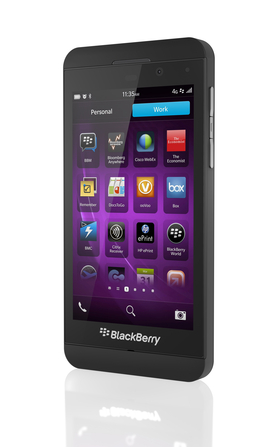BlackBerry, formerly known as Research In Motion, (BBRY) is giving away its BlackBerry Messenger Service (BBM), the company announced at its Live Developer Conference in Orlando, in hopes to stay afloat in the smartphone industry. Sixty million monthly users communicate with BBM, the company’s most valuable asset. BlackBerry (formerly Research in Motion) also announced BlackBerry 10—its new operating system—and several new handsets including the Q5. However, these announcements were overshadowed by the BBM giveaway. What does this mean for BlackBerry and how will it affect the smartphone industry?
BlackBerry To Offer BBM To iOS And Android Operating System- For Free
The biggest announcement of the conference was that the company had decided, after much consideration, that it would make its proprietary BBM messenger service available for free to iOS and Android platforms, according to CNN.com — a service that was once only available on a smartphone by BlackBerry. It won’t be available for these other platforms until a free app is issued sometime during the summer of 2013.
BlackBerry hasn’t provided any details as to why the company decided to open BBM to Apple and Android phones. The International Business Times UK Edition stated that when you add the news to the other announcement about the creation of BBM channels, a feature that BlackBerry says is a way to allow multiple users to engage with one another simultaneously, it seems as though the company may be reinventing what was once regarded as a “humble” messaging app as the next social network.
The multiple channel feature will be rolled out first on BlackBerry phones and won’t be a feature on iOS or Android phones for some time.
What Prompted BlackBerry To Do This, And What Lies Ahead For The Company?
That is not the only change for the company, which is now under the leadership of CEO, Thorsten Heins, who proudly said that the announcement was a “statement of confidence.” Andrew Bocking, BlackBerry’s Executive Vice President of Software Product Management & Ecosystem, said that users have asked for the multiple channel feature for years, but the thing that really facilitated this was the launch in early 2013 of BlackBerry 10, the all new, highly updated platform that serves as the phone’s operating system, according to the International Business Times UK.
BlackBerry may be thinking that BBM could conceivably become the “premier messaging app for companies who want to monitor employee communications,” Cyrus Sanati of CNN Money theorizes. Although text and data charges in the United States have dropped considerably, that may not be the case in other countries. More than that, though, it is also possible that the company wants to become a leading force in the competitive world of mobile marketing, and the use of BBM to do that would be quite innovative.
BBM’s ability to create chats with as many as 30 people could be an excellent way for companies that want to schedule group meetings to do so without having to deal with the difficulty of finding a time that works for all employees. By communicating via BBM, employees would be able to attend meetings from home — without the need to find a babysitter for the kids, or deal with the hassle of having to drive back to work and then home again.
What Does The Future Hold For BlackBerry?
One can only speculate about the BlackBerry’s future. One thing that the company hopes for is that BlackBerry’s hyper-connected, tech-savvy individuals who use the devices, will see BBM’s channels as a product could be very appealing to advertisers. But David Proulx, the man in charge of BlackBerry’s BBM advises the public that any effort to monetize the BBM channels’ platform is premature, and it won’t happen for quite a while, the IB Times UK notes.
It seems clear that BlackBerry’s goal in opening BBM to other operating systems, is to broaden their user base, as they simultaneously engage with the new base they hope to build. BlackBerry also has an advantage in certain parts of the world — especially third world countries, such as Indonesia and Nigeria, infamous for unreliable wireless services, according to CNN. Third world countries are considered the world’s fastest growing market for smartphone use. BlackBerry has its own global data network, and because both incoming and outgoing messages are encrypted, BlackBerry clearly has a safer network — at least in places where transmission is extremely hard, if not impossible.


